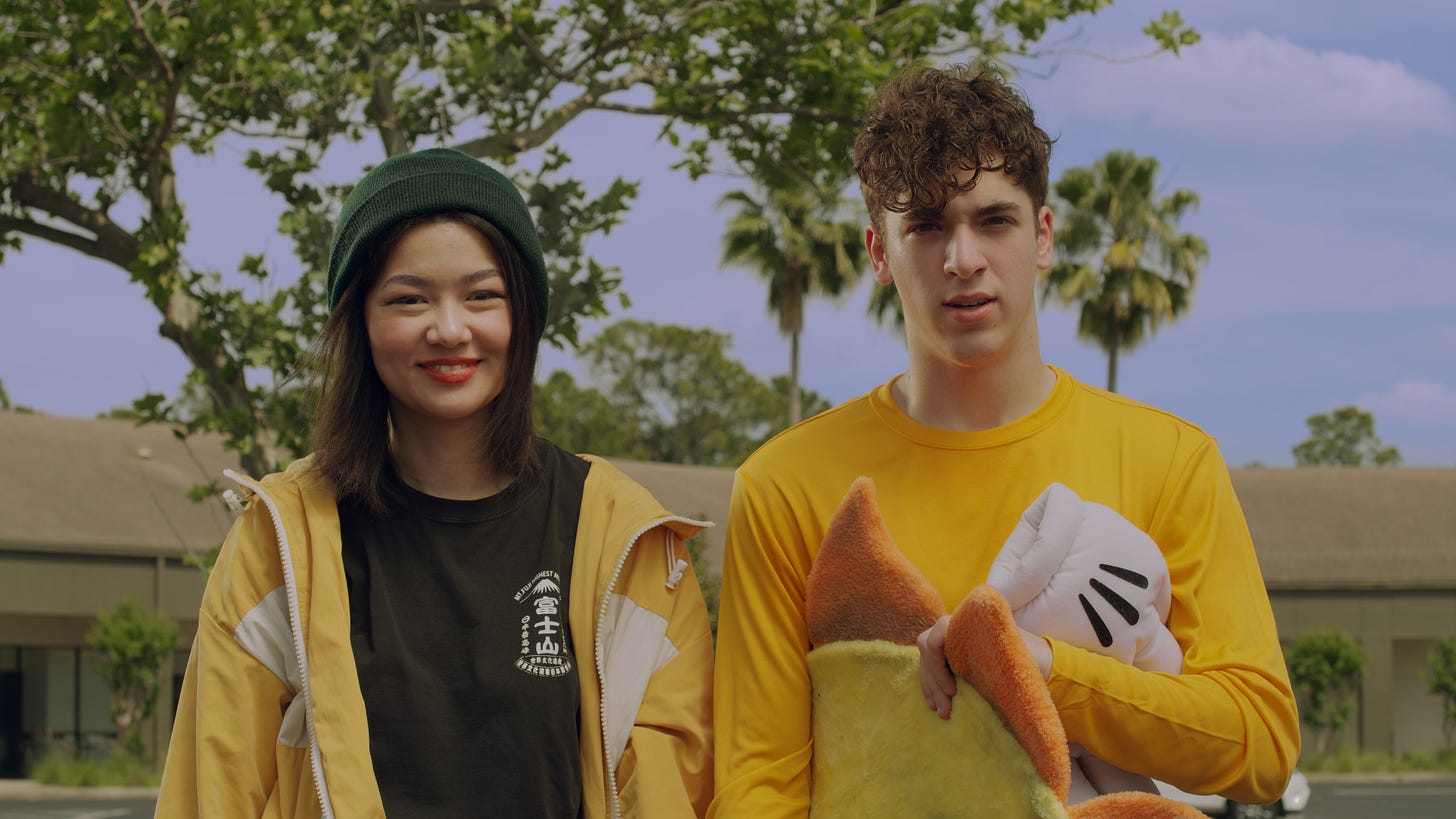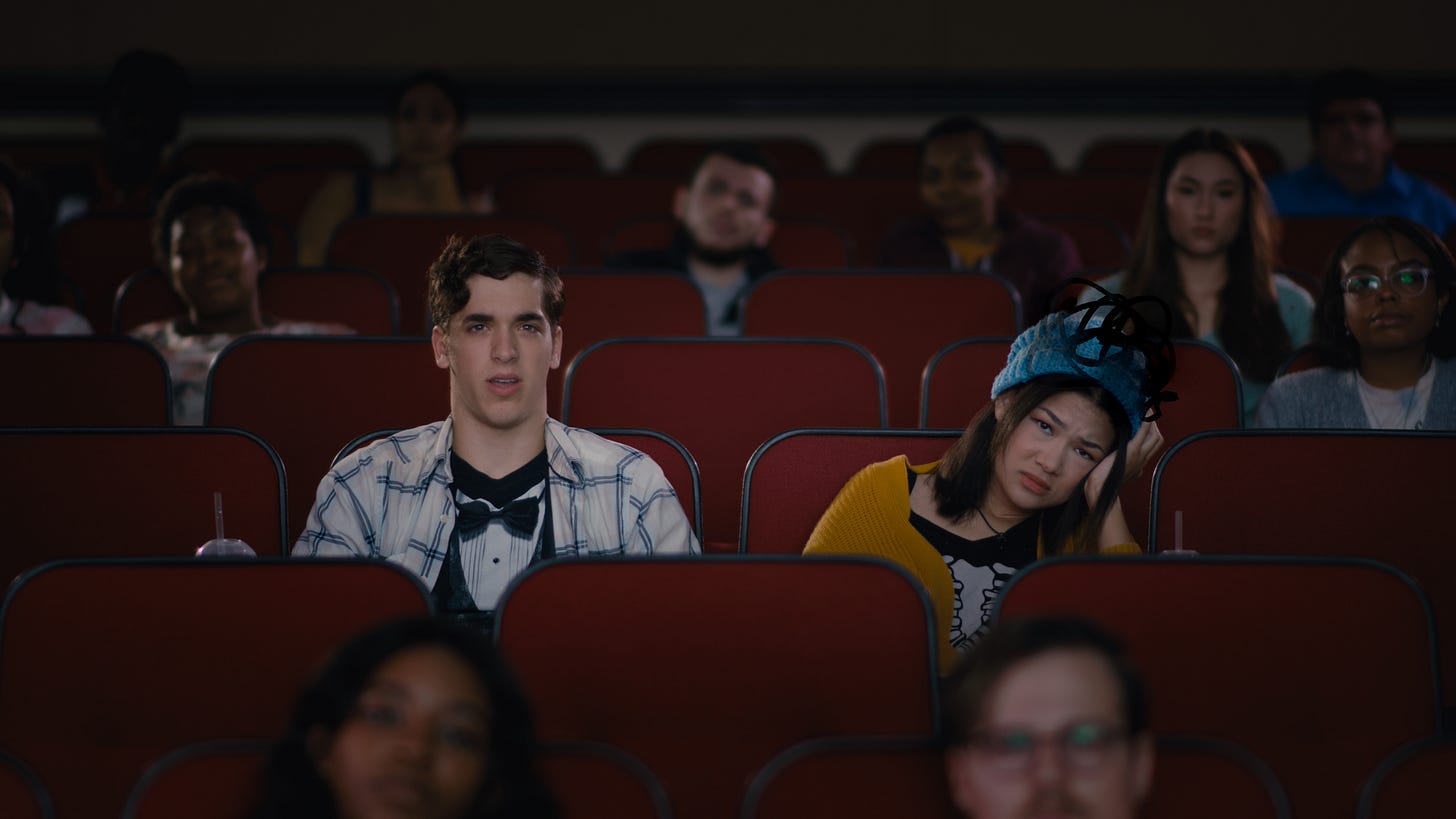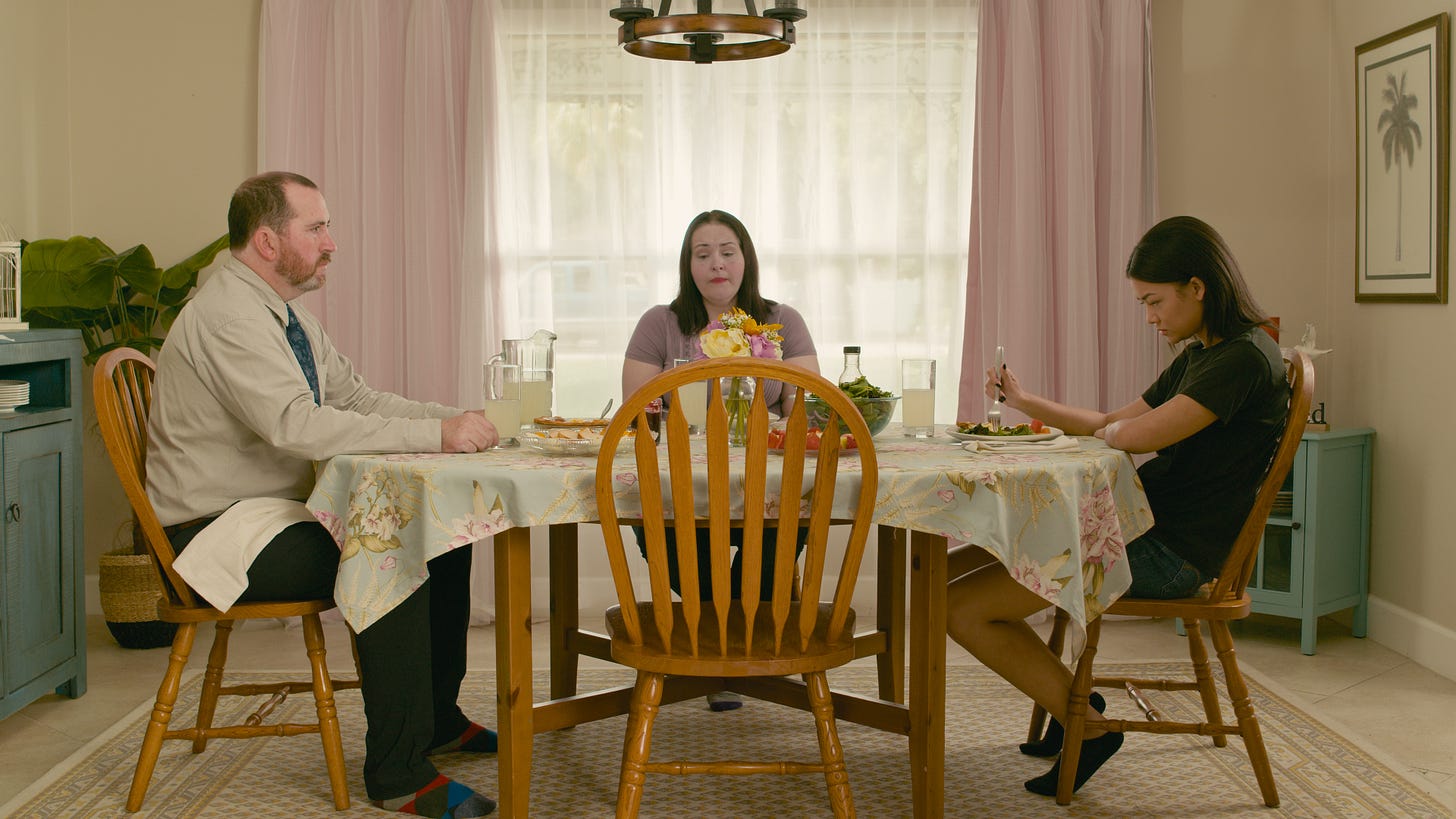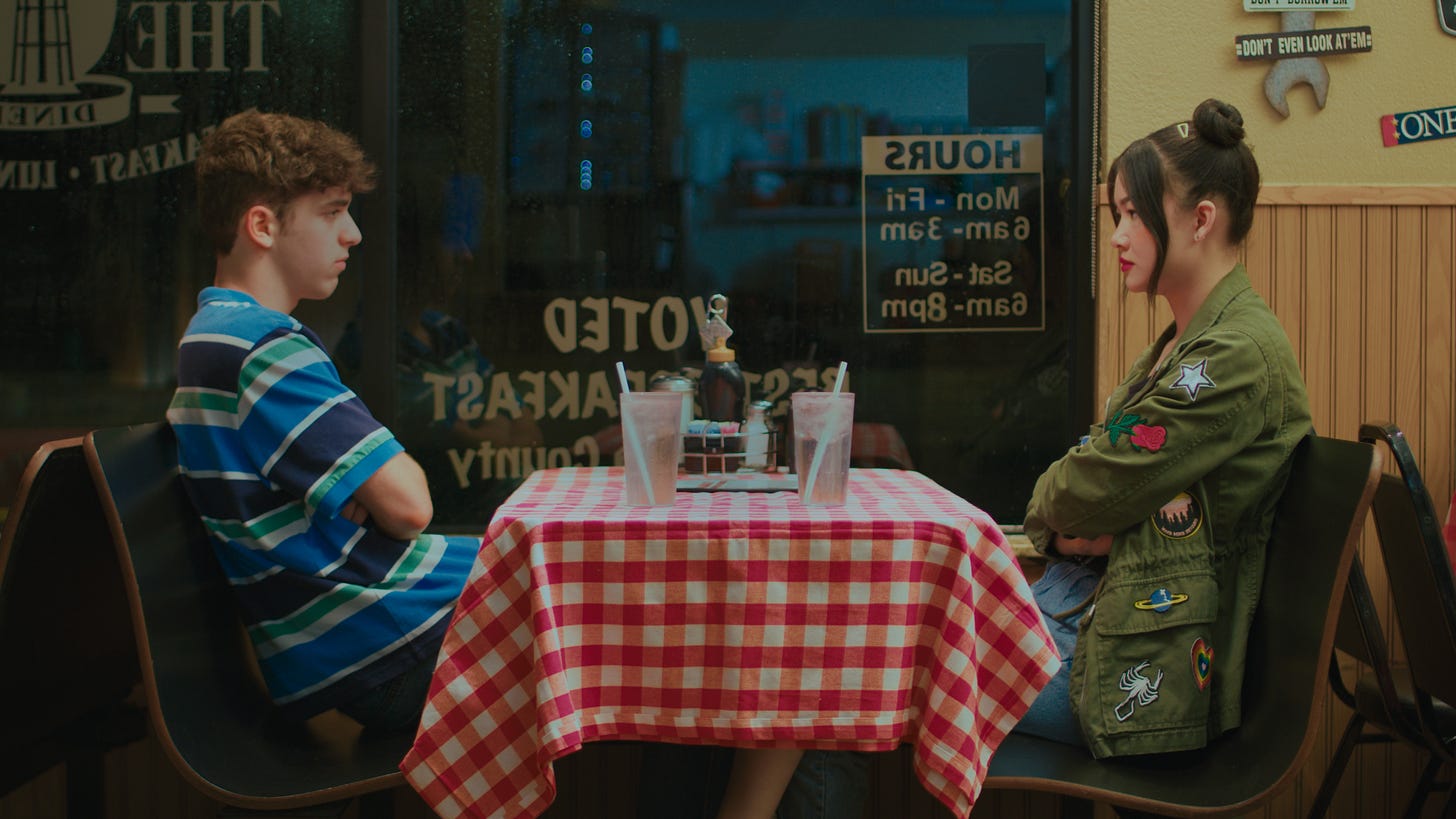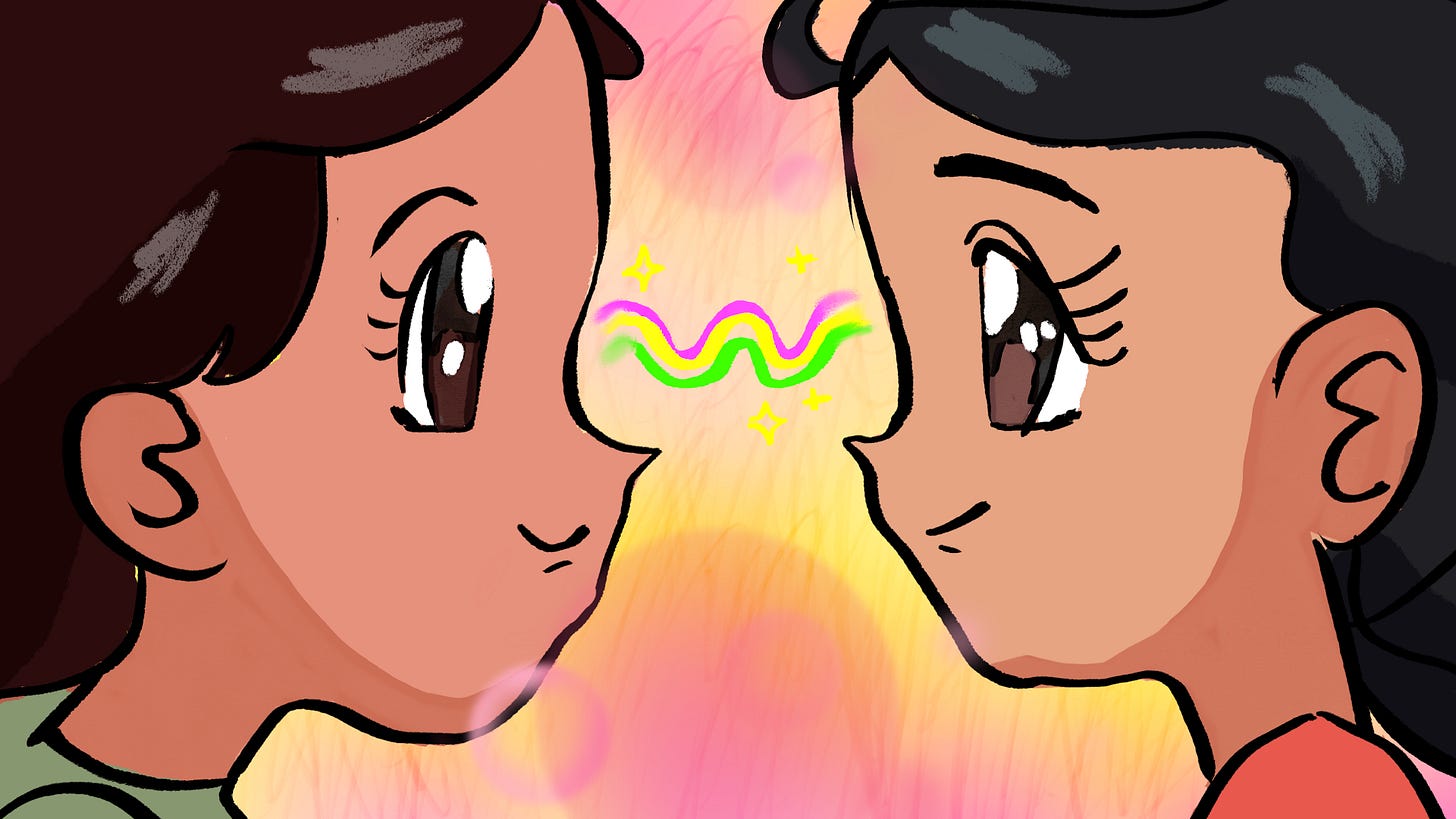Egghead & Twinkie Review: In the Zone
Adding cartoon flair to a cute coming-out comedy
There's a word used in Egghead & Twinkie that I didn't think I'd ever hear again uttered by a character you're meant to sympathize with. It got my attention, particularly as I'm at the age where I recognize that language is changing in ways that are sometimes leaving me out.
That word is “friend-zoned.”
There was a time on the Internet, and in film discourse, that using that word got you accused of propagating rape culture, because supposedly by even justifying its existence you were saying some men were owed sex by women just for being nice to them. This was about the same time that so much of Film Twitter was about focusing on “problematic” elements, and headlines thundered that “WE NEED TO TALK about Bryce Dallas Howard running in high heels in Jurassic World,” and so forth. The backlash to that has ushered in even greater stupidity from the MRA hate-click-o-sphere, so that at times I'm almost nostalgic for the older days. Anyway, the point is I accepted at the time that the whole “friend-zone” concept was now to be considered outdated language, needing a substitution.
Or maybe kids today are just mature enough to discuss it without broadly tarring one another? Here's how I understand the concept: as a Gen-Xer, when I was in my twenties, most of my female friends either outright said, or agreed with the statement, that a women can determine within five minutes of meeting a man if she would ever consider having sex with him. [My wife disagrees with this and says it's the reason I didn't marry anyone my own age.] Now, maybe this is the problem with the wording: if she decides that answer is “no,” you're not necessarily automatically in a “friend” zone or category. You could be in an enemy zone, or, Star Trek fans, a neutral zone. A friend zone isn't inherently bad – it's only hurtful if one friend falls for the other and the feeling is not mutual. And by the way, while it is often the straight dudes who fall, I have known women who had unrequited romantic feelings for best male friends too.
Blame some of this on our Boomer parents, who taught us, or at least me, with language like “My wife is my best friend!” and “It's better when you're friends first!” thus creating a picture of a world in which your best friend of the opposite sex eventually becomes your true love. I find that rarely happens; what more often happens if you do things right is your lover becomes your best friend too. I have indeed fallen for female friends before, and after going through it twice, I realized it's best to just squash it, because those two never spoke to me again, and I hated losing them as friends. So when the feelings happened again, I said nothing, and kept the friendship. Infatuation goes away eventually. (There was also one other who I'm fairly certain deliberately dangled the possibility of romance for her own validation while never following through, and I'm happy to be rid of her in my life.)
Anyway, Egghead & Twinkie is about two teenagers soon headed for college, and lifelong friends of the opposite sex – “Egghead” (Louis Tomeo, of Nickelodeon's Every Witch Way), the guy, develops romantic feelings, while “Twinkie” (impressive newcomer Sabrina Jieafa), the girl, realizes she's gay. It's a situation sure to elicit cringes from anyone who has been there, but crucially, the characters work through it and talk it out. I personally think Egghead hangs on to the grudge a bit long, but he is not me, after all; he'd rather verbalize his hurt constantly, even as he should clearly have just taken no for an answer. Twinkie, though, has her own issues, and while she isn't using him to bolster her esteem, she does effectively use him as a designated driver, due to not having her license yet, even in situations where she probably should not.
Notably, Twinkie has been texting and talking to a fellow lesbian online who goes by the alias “BD” (the “b” is for big, the “d” for a word that's a slur if I say it). The latter is a DJ in Texas, who's about to host a massive lesbian dance party. Twinkie, based in Florida, plans to go and meet her there, but her only ride is Egghead, so she tells him they should take a road trip together, pretending that the goal is a tour of Funimation studios (she's an aspiring cartoonist and animator, which informs the whole look of the film). As part of the whole friend-zone incident, one unanticipated side effect was her coming out as gay to her conservative parents, whose reaction wasn't great, so the road trip also serves as her running away from home...at least temporarily. In a car stolen from her Dad's business, so it has a massive photo of him on the side, along with his phone number.
You might suppose that in a story with a gay protagonist, “Twinkie” has a certain meaning, but it may not be what you think – as the story soon makes clear, the word is a slur for assimilated Asians in the same manner that “Oreo” is often used against certain Black people. Twinkie is adopted and her parents are white – she has assumed her heritage is Chinese but doesn't know for sure, as she was adopted in Miami. Taking the name Twinkie is a way of appropriating a term intended as hurtful, and making it her identity.
That all may seem like a lot of baggage and identity politics for one movie, but this is a comedy, and one about teens figuring out the nuances that their parents have sadly turned into simplistic slogans. I remember at that age being surprised that everyone in college was willing to talk through issues of identity and bigotry and oversimplification – having come from a pretty damn white background, I had wrongly assumed everyone else would be militant about policing every word I said for possible racism. Perhaps it helped that social media wasn't a thing, and I wasn't even online, so all these conversations happened in person. Egghead & Twinkie affirms the value of that, showing how online conversations can indeed be easily misconstrued, but people who talk through things face to face can usually come to a better understanding, even if it takes a while.
Writer-director Sarah Kambe Holland nails the truth of conversations like these, at least to the extent that I remember any similar – neither lead character is yet confident enough to fully be themselves, yet by allowing one other to be drastically imperfect, impulsive, and petty in front of one another, they unwittingly prove they have the hard part down. This isn't just a movie about talking, though – a cartoon aesthetic runs throughout, with costumes and color saturation turned up, almost as if the rainbow pride flag infused every shade with its bright hues, and occasional animated flourishes and sound effects appearing onscreen, courtesy of animator Dillon “crabub” Cefalo.
That the drawings are simple may bring to mind Scott Pilgrim, an acknowledged influence, but I was more reminded of The Mitchells vs. The Machines, which also featured as its lead character a lesbian teen aspiring filmmaker, who often visualizes the world in cinematic terms. Egghead & Twinkie creates more realistic jeopardy than a robot attack, obviously, but there's one particular situation involving a restaurant tab that impresses by how real it keeps the comedy that ensues from the classic premise. What they do is what you might do if you were a quick thinker, as opposed to what the Three Stooges or Pee-wee Herman or whoever else we've seen in such circumstances might do.
You'll see where the movie's going ahead of time, at least if, like me, you're significantly older than the people onscreen. That's okay – everyone's teen years may be different, but they often check off the same emotional boxes. What matters is if you relate to and root for these two lifelong -- if momentarily self-sabotaging -- friends to figure it out. Ironically, they may be in the friend zone, but I swear I've had some of their arguments during the course of my marriage, which goes back to my original point that lovers eventually do become best friends if you do it the right way. Still, there's nothing wrong with “just” being best friends either. Tomeo and Jieafa are cute and charming, as is Asahi Hirono as a pleasantly goofy waitress who attracts them both, and that's what makes all the difference in an indie like this. They can be my imaginary cinematic friends any day.
Egghead & Twinkie is available on demand starting April 29th, with a Special Screening in Los Angeles, including Q&A with filmmakers and cast Thurs, April 24, 7:00pm, at the Laemmle Glendale
All images courtesy of CanBeDone Films
Prefer not to subscribe via Substack? You can leave a tip through Buy Me a Coffee instead.



